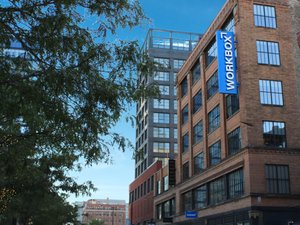The hobbyist has turned entrepreneur.
While the Maker Movement was comprised of a hacking, tinkering "tech-influenced DIY community," the next wave of makers is interested in creating physical products and startups that can scale. In Chicago, where the infrastructure for this new type of founder is growing, these hybrid maker-entrepreneurs are more likely to be connected to the tech and startup community, seek funding and community on crowdfunding sites, and create products that blur the lines between art, engineering and design.
While there are plenty of maker-entrepreneurs hustling everyday, here’s a look at seven emerging startups to keep an eye on:
Lystr, founded by Kara Scanlin, is a connected IoT device that helps you create a grocery list on your smartphone. The device will be plugged into an outlet on the wall, and users swipe a barcode past the device or say an item they want added to their list, and Lystr will automatically add it to the Lystr smartphone grocery list app. Scanlin took up electronics tinkering after receiving her MBA at University of Chicago Booth School of Business, and initially started working on Lystr out of Catalyze (she's now based out of mHUB Chicago). Scanlin was just accepted to WiSTEM, and is gearing up for a limited release pilot, testing the product with 50 to 100 users.
4women
This University of Chicago Booth School of Business startup is aiming to replace the pap smear with an at-home, self-collection device for cervical cancer screening. They're currently developing a prototype (based off their own experiences in cervical cancer screening, scientific literature, and experts in scientists, biomedical engineers, and material engineers) at the Polsky Center fab lab, and will be working on a functional prototype moving forward. They're also among the 30 semi-finalists for the UChicago New Venture Challenge.
While Scott Urban used to make custom wooden glasses for the likes of Graham Elliot and Reggie Watts, he recently launched a new line of glasses that's attracted a different (and larger) audience. He's the maker behind Reflectacles, reflective eyewear created with a material rated to be seen from 1,000 feet away. These can be used for bike and night walker safety (they'll reflect an oncoming car's headlights, for example) or as a unique nightlife accessory. Urban also expanded the Reflectacles line to include an infrared-reflecting material that caught on with privacy advocates (even garnering a retweet from Edward Snowden), as it renders a face unrecognizable to facial recognition software used in surveillance. He raised $41,315 on Kickstarter (well above his $28,000 goal) for the Reflectacles project, and is expecting to ship orders this summer.
This venture, based out of Z-Axis Factory, is a custom and contemporary clothing line. Started in spring of 2015, designer Jessica Hellgeth focuses on custom individual commissions and designs that have ranged from evening wear to cosplay and costuming. She also sells her designs on Etsy.
Curious Technologies, the startup behind NWTN, is using hardware to better monitor concussions in sports. Their device is placed inside a player's helmet and can measure a player's hits and level of impact. That information is synced to a coach's smart phone, where it is displayed through a graph and 3D visualization. The team behind NWTN was a finalist on America's Greatest Makers, where they won $100,000 for their invention, and they'll be taking pre-orders this summer. They're based out of mHUB Chicago.
Roman Titus, founder of Sojourn Fare and based out of the Center for Lost Arts, is bringing IoT to mushroom farming. His product is made up of a system of eight different sensors that measure environmental data (such as humidity, CO2, air quality, and luminosity) that can trigger changes in the environment to ensure optimal growing conditions (a rise in CO2 could turn on an exhaust fan, for example). This method dramatically increases the yield: A typical mushroom farm gets about a half a pound of mushrooms per square foot of space, whereas Titus' units produce about two pounds of mushrooms per square foot of space in the same time period. He piloted the unit with Google Chicago's cafeteria last summer, and is currently merging with a large mushroom farm to do additional R&D on the system. Eventually he'd like to create mobile units that could be managed by hobby or small-scale farmers.
The Beton coffee storage vessel was created to better preserve coffee beans. The device is made of concrete and cork, which helps prevent excess moisture, air, and light from reaching the beans. Originally it was designed as a project by then-student designers Dan Cigler and Travis Koss in University of Illinois at Chicago's Entrepreneurial Product Development class, where they successfully funded a small production line of the coffee vessels on Kickstarter. Now Cigler is redesigning the Beton based off customer feedback with the intent of easier manufacturing and ability to scale, and he's expecting to launch a new Kickstarter mid-May. Cigler said the redesigned Beton will be a the first product in a new home goods line that "supplement[s] your home's décor with meaningful objects" through his custom furniture company Hauform.








